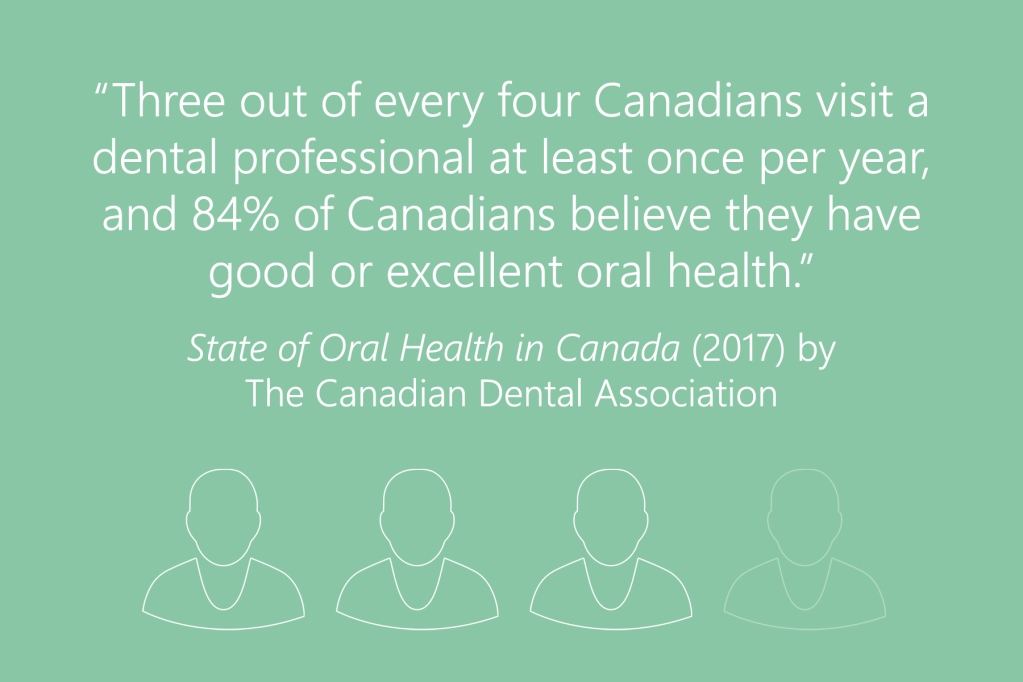Some, maybe even most individuals that come to your office are very motivated when it comes to keeping up their oral hygiene routine. For most offices, however, there are a few patients that struggle to allocate time for the necessary hygiene practices that prevent oral disease. Can you do more to ensure your patients are sticking to proper oral health habits in-between visits? In this week’s blog, we are going over some approaches that your office can take that may help prevent your patients from falling back into old habits.
In comparison to other countries, Canada has great dental care and limited individuals with oral disease. CDA’s status report of Canada’s oral health recognizes the country’s relatively good oral healthcare, particularly when viewed on a global scale. They state in the report that “based on a wide range of metrics, we can state definitively that Canada is among the world leaders when it comes to the overall oral health of its citizens.” The report also acknowledges, though, that there are some groups of people in Canada that suffer from poor oral health due to barriers such as physical, socioeconomic, and geographical restraints.

Ensuring your patients are going home with knowledge of proper hygiene upkeep is a crucial part of recall visits, but unfortunately, patients tend to fall back into old habits after a few weeks. Thankfully, there are certain approaches your office can take to counteract this issue and encourage patients to continue their oral hygiene regimens at home.
Prioritize the provider-patient relationship
Having a positive experience at your office is a large factor that contributes to your patients’ at-home care, especially those with anxieties surrounding dental care or healthcare in general. Having a good experience establishes trust with your patients and motivates your patients to continue oral hygiene habits at home. The dentist-patient relationship is defined in this article as “the core of dentistry” (Bishop 2018). Generally, patients are more likely to remember instructions and advice given to them from someone they have a positive relationship with and can relate to on an interpersonal level. The best way to leave a lasting impression on your patients is by showing compassion and maintaining professionalism. Soft social skills make a world of difference when it comes to the patient’s experience. A positive experience at your office will motivate patients to continue proper hygiene at home.
Encourage healthy habits through your online presence

We have spoken before about the benefits of running a social media page for your practice. Even if your practice has a small following online, posting some generalized oral hygiene tips on your social media page (i.e. Instagram, Twitter, or Facebook) has the chance of making a difference, even it is small. Additionally, using your platform to debunk and discourage “DIY trends” that are harmful for patients may prevent your audience from trying at-home remedies that cause harm to their oral health.
While social media usage can provide many opportunities for your practice, you must follow the guidelines of professionality to stay in accordance with the associations in your area. RCDSO, for instance, provides an advisory for maintaining dental professionality on social media and offers some insight on best practices for social media use. Whether you are regularly updating your social media outlets, or sporadically posting, your office is still reinforcing good oral hygiene habits for your patients in a virtual and casual fashion.
While using the approaches mentioned in this blog may help patients become more enthusiastic about their oral health, they may also just serve as regular best practices for your office. Whether or not your patients are influenced by your potential social media usage or nonjudgmental listening, these approaches still work for the betterment of your office. Patient care is the most important, and while dental offices transition towards a post-COVID-19 future, these approaches may not be a priority if your practice is not ready to utilize specific online tools. Prioritizing the provider-patient relationship is prevalent whether you utilize social media or not, as doing this is viable for most appointments and social skills can always be refined.



